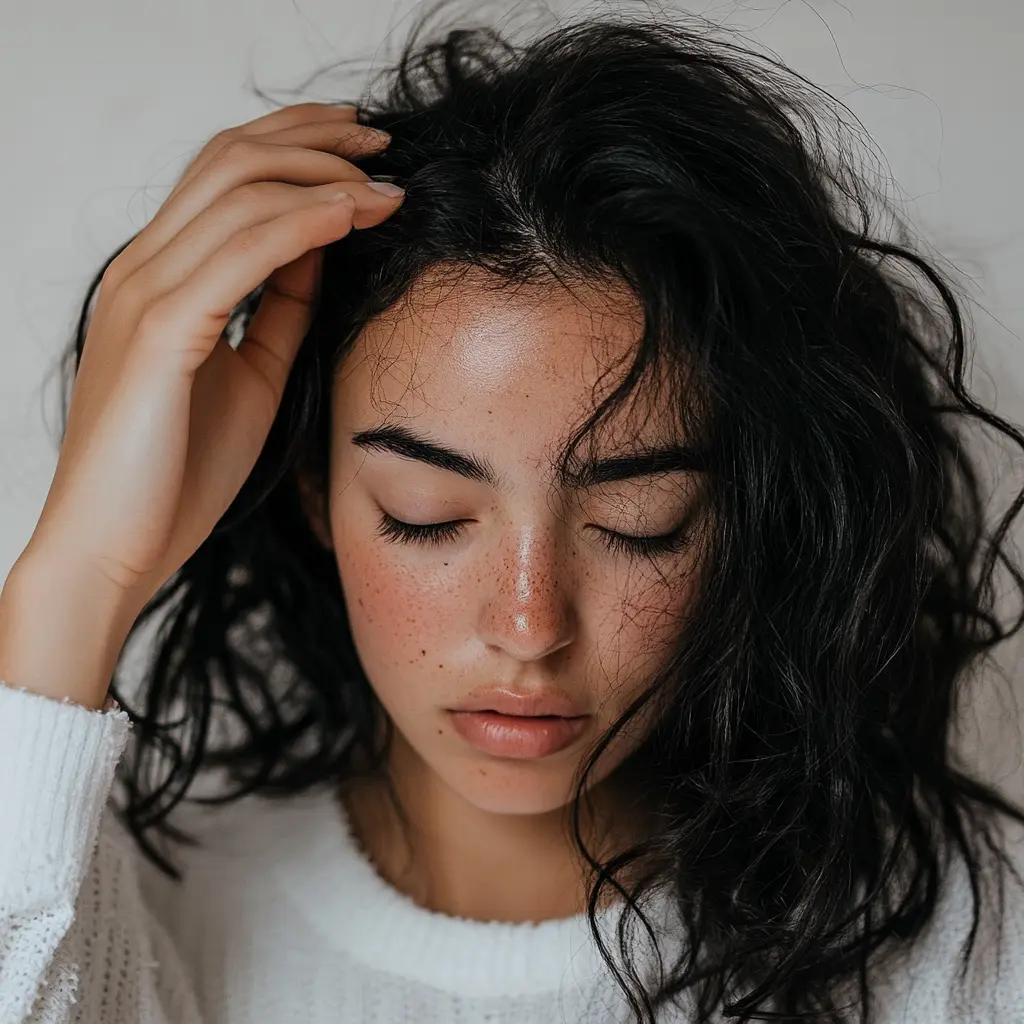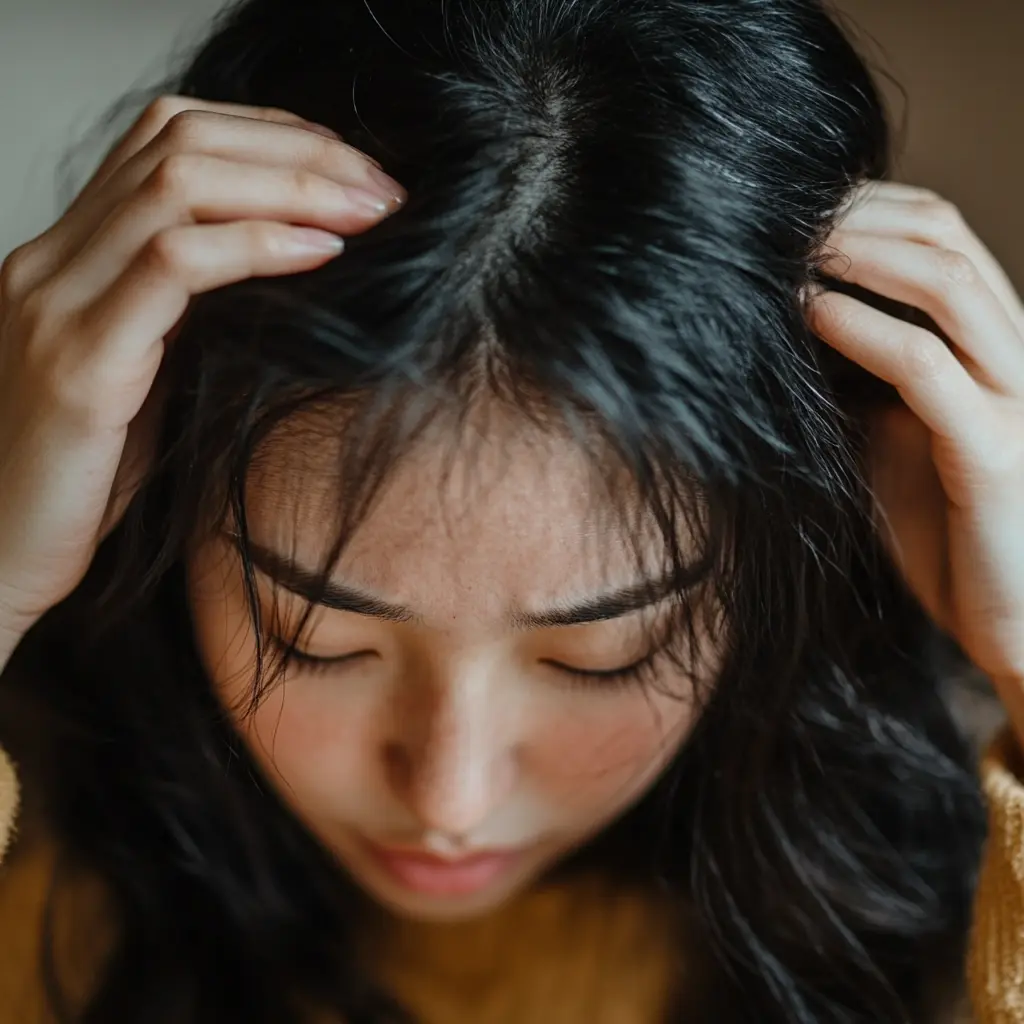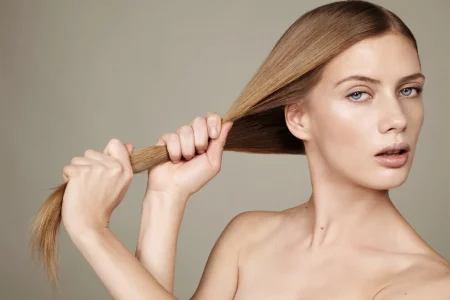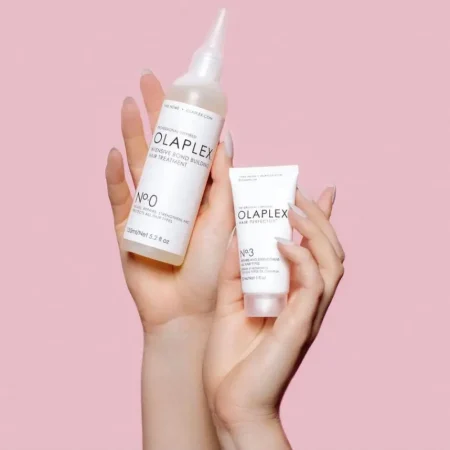Let’s face it: dealing with dandruff is no fun. Whether you’re rocking dark-colored shirts and trying to hide those pesky white flakes or scratching your itchy scalp in the middle of a meeting, dandruff can be a real confidence killer. While it’s a common condition that affects millions of people around the world, that doesn’t make it any less annoying. But don’t worry, you don’t need to rely on harsh chemicals or expensive treatments to tackle those flakes. There’s a whole range of natural remedies for dandruff that can help you get your scalp back on track — without the need for a prescription.
In this article, we’re diving into some of the best natural remedies for dandruff that you can easily incorporate into your hair care routine. From the well-known powers of tea tree oil to the soothing effects of aloe vera, we’ve got you covered with simple, effective solutions. Plus, we’ll talk about some lifestyle changes that can help prevent dandruff from making a comeback.
The best part? These remedies aren’t just effective, but they’re also gentle on your scalp and hair. You won’t have to worry about harsh ingredients or artificial fragrances. Instead, you’ll be using natural, plant-based ingredients that work with your body to calm irritation, reduce flaking, and promote a healthy, happy scalp.
Ready to say goodbye to the flakes and hello to a smoother, healthier scalp? Let’s jump right in and explore the top natural remedies for dandruff that actually work.
What is Dandruff?
Dandruff is that pesky condition where your scalp sheds dead skin cells, causing those annoying white flakes to appear in your hair and on your shoulders. It’s pretty common, and while it’s not harmful, it can definitely be frustrating and a little embarrassing. So, what exactly causes dandruff? Let’s break it down.
Understanding Dandruff: Causes and Symptoms
Dandruff often happens when your scalp produces too much oil, which creates the perfect environment for a type of yeast-like fungus called Malassezia to grow. This fungus feeds on the oils, causing irritation and inflammation. As a result, your scalp starts to shed dead skin cells in larger quantities, which shows up as those visible flakes.
There are a few main culprits behind dandruff:
- Dry Skin: When your skin gets dry (especially in winter), it can flake off, causing dandruff.
- Seborrheic Dermatitis: This is a more chronic condition that causes red, oily, and scaly patches on the scalp. It’s often linked to dandruff.
- Fungal Infections: When Malassezia (that yeast-like fungus) grows too much, it can irritate your scalp and lead to dandruff.
- Sensitivity to Hair Products: Certain shampoos, conditioners, or styling products can irritate the scalp, making dandruff worse or even causing it to appear.
Common Dandruff Symptoms
Dandruff can look and feel different from person to person, but some of the most common symptoms include:
- Dry or Oily Patches: You might notice flaky spots on your scalp, which could be dry or greasy.
- White or Yellowish Flakes: These can show up in your hair or fall onto your shoulders.
- Itching and Irritation: The scalp can get itchy, and scratching it can sometimes make the flakes worse.
So, while dandruff is usually harmless, it can be a real hassle. But don’t worry—there are plenty of natural remedies to help control it.
Top Natural Remedies for Dandruff
Tea Tree Oil – A Powerful Antifungal Agent
Tea tree oil has been a go-to natural remedy for a long time, and for good reason. It’s packed with anti-inflammatory and antifungal properties, which can help tackle the root causes of dandruff, like scalp irritation, excess oil, and the yeast that causes flakes.
In fact, a study in the Journal of the American Academy of Dermatology showed some impressive results: After just four weeks of using tea tree oil, participants experienced noticeable improvements in their dandruff and scalp irritation.
How It Works
What makes tea tree oil so effective is a compound called terpinen-4-ol. This substance has powerful antifungal and antimicrobial abilities, which means it helps zap the Malassezia yeast (the main culprit behind dandruff) and other fungi that might be lurking on your scalp. Plus, it’s great for reducing inflammation, soothing that constant itch, and calming any irritation.
How to Use Tea Tree Oil for Dandruff
- DIY Scalp Treatment: If you want to go the DIY route, mix a few drops of tea tree oil with a carrier oil like coconut or olive oil. Massage the blend into your scalp for about 5-10 minutes, let it sit for 30 minutes, and then rinse thoroughly. It’s a simple, effective way to fight those flakes.
- Shampoo with Tea Tree Oil: If you’re short on time or prefer something more convenient, look for a shampoo with at least 5% tea tree oil. This gives you a controlled amount of the oil, so you get all the benefits without overdoing it.
Expert Tip: Tea tree oil is powerful stuff, so it’s a good idea to start with a small amount to make sure your scalp doesn’t react.
Apple Cider Vinegar – The Acidic Solution
Apple cider vinegar (ACV) is a go-to natural remedy for dandruff, thanks to its ability to balance the pH of your scalp and help remove dead skin cells. Its acidity also works to prevent yeast overgrowth, which can be a key culprit behind those pesky flakes.
How ACV Works
ACV helps keep your scalp’s pH balanced, which makes it harder for fungus to thrive and cause dandruff. Its astringent properties also help cut down on excess oil, keeping your scalp from getting too greasy and reducing flake buildup. Plus, the natural acidity of ACV acts like a gentle exfoliant, sloughing off dead skin cells and boosting blood flow to your scalp for a healthier overall environment.
How to Use Apple Cider Vinegar for Dandruff
- ACV Rinse: Mix 2 tablespoons of apple cider vinegar with 1 cup of water. After shampooing, pour this mixture over your scalp and massage it in. Let it sit for a few minutes, then rinse with cool water. The rinse helps reset your scalp’s balance and tackle flakes without over-drying.
- ACV and Honey Mask: Combine equal parts apple cider vinegar and honey, then massage the mixture into your scalp. Leave it on for about 20 minutes before rinsing thoroughly. Honey is moisturizing, so it helps calm and hydrate the scalp, adding some extra relief to the mix.
These simple, natural methods can go a long way toward getting rid of dandruff without harsh chemicals, and they’re easy to add to your regular routine!
Coconut Oil – Moisturizing and Anti-inflammatory
Coconut oil is a go-to natural remedy for many skin issues, including dandruff. It’s packed with fatty acids that work wonders for your scalp by moisturizing, soothing irritation, and even tackling the root causes of dandruff.
Why Coconut Oil Works
The secret to coconut oil’s effectiveness lies in its lauric acid content. This powerful acid has antifungal properties, which help combat the yeast (Malassezia) responsible for dandruff. It also provides deep moisture to your scalp, reducing dryness and flakiness, while soothing itchiness caused by irritation.
How to Use Coconut Oil as a Natural Remedies for Dandruff
- Coconut Oil Massage: Warm up about a tablespoon of coconut oil and gently massage it into your scalp for around 10 minutes. Let it sit for at least 30 minutes (or overnight for maximum benefit), then wash it out with your regular shampoo.
- Coconut Oil Shampoo: If you prefer a quicker option, look for a shampoo that already contains coconut oil, or just add a few drops of pure coconut oil into your usual shampoo to give your scalp some extra love.
Pro Tip: For added antifungal power, mix a few drops of tea tree oil into the coconut oil before applying it to your scalp.
Aloe Vera – Your Scalp’s Best Friend for Calm and Relief
When your scalp feels itchy, inflamed, or downright irritated, aloe vera comes to the rescue. Known for its incredible soothing properties, aloe vera is a go-to natural remedy for dandruff. Its anti-inflammatory and antifungal benefits make it especially effective at tackling flakes while keeping your scalp happy and healthy.
Why Aloe Vera Works Wonders
Aloe vera is packed with enzymes and compounds that gently remove dead skin cells—one of the main culprits behind dandruff. On top of that, it’s a natural anti-inflammatory, so it calms redness, soothes itching, and leaves your scalp feeling refreshed.
How to Use Aloe Vera for Dandruff Relief
- The Classic Aloe Vera Gel Treatment
- Scoop out fresh aloe vera gel (straight from the plant if possible) and apply it to your scalp.
- Leave it on for 20-30 minutes to work its magic, then rinse with lukewarm water.
- For an extra boost, mix it with a few drops of coconut oil before applying.
- Aloe Vera + Lemon Combo
- Combine aloe vera gel with freshly squeezed lemon juice to create a potent scalp treatment.
- Massage it into your scalp and let it sit for 15-20 minutes before washing off.
- This blend helps balance your scalp’s pH while adding a touch of antimicrobial power.
Pro Tip: If you struggle with an itchy or red scalp, aloe vera can be your all-in-one soothing remedy. Use it once or twice a week for the best results—and prepare to feel the difference!
Whether you use it solo or as part of a mix, aloe vera is a gentle, natural way to keep your scalp calm and flake-free.p redness and itching, making it a perfect all-around remedy.
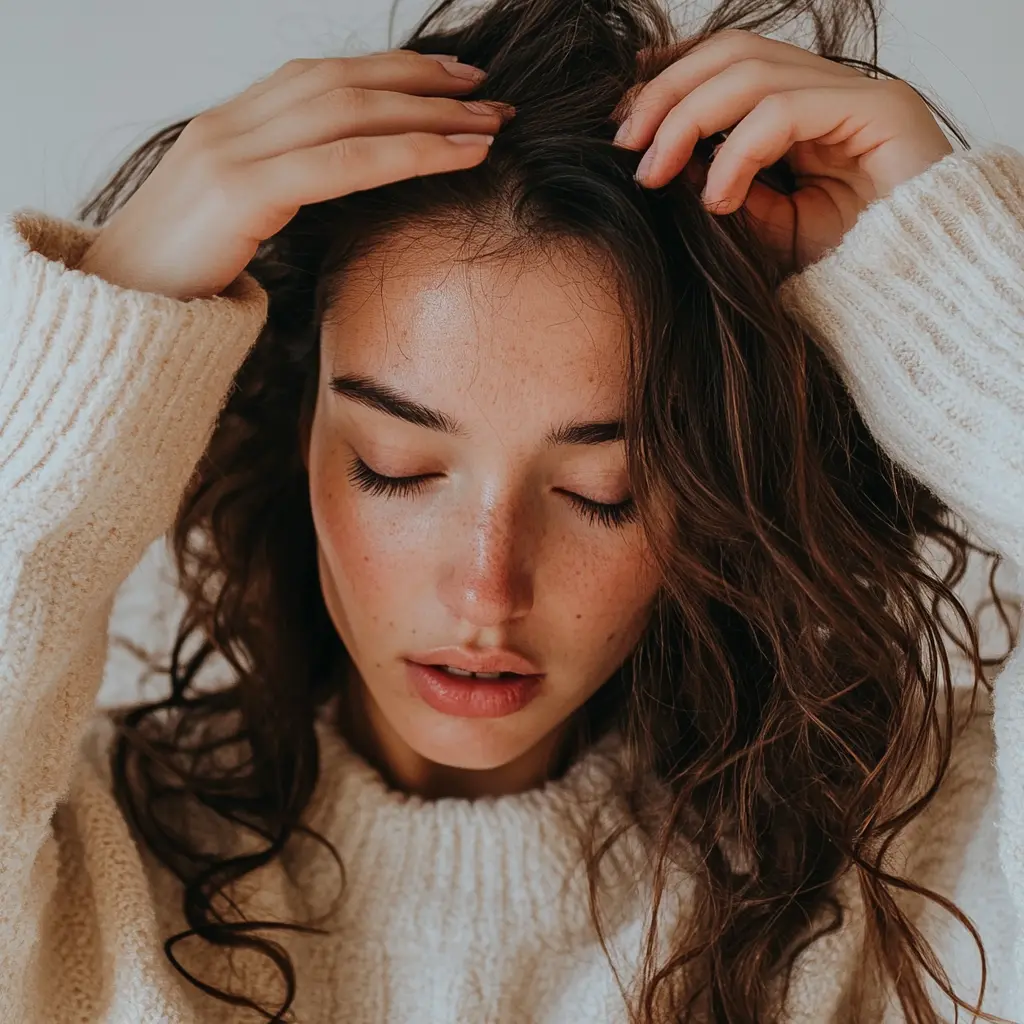
Peppermint Oil – Your Scalp’s Cooling Relief
If your scalp feels irritated, itchy, or inflamed, peppermint oil can provide the relief you need. Known for its cooling effect, peppermint oil helps soothe an uncomfortable scalp and reduce the urge to scratch. Its menthol content boosts blood circulation to the scalp, promoting a healthier environment for your hair follicles. Plus, peppermint oil has antifungal properties that target Malassezia, the yeast often responsible for causing dandruff, helping to keep flakes at bay.
Why Peppermint Oil Works
Peppermint oil is more than just refreshing—it’s packed with menthol, which creates a cooling sensation that calms irritation and inflammation on the scalp. This cooling effect not only helps relieve itching but also improves blood flow to the scalp, encouraging healthier hair growth. Additionally, peppermint oil’s antifungal properties tackle the yeast and fungi that can lead to dandruff, making it a powerful natural remedy for flakes.
How to Use Peppermint Oil for Dandruff Relief
- Dilute a few drops of peppermint oil with a carrier oil like coconut or olive oil.
- Gently massage the mixture into your scalp, ensuring even coverage.
- Let it sit for 15–20 minutes, then rinse it out with warm water.
Pro Tip: The cooling sensation of peppermint oil can feel especially soothing if your scalp is irritated or inflamed. Just be sure to dilute the oil properly to avoid any discomfort. Regular use can help you maintain a refreshed, flake-free scalp!
Fenugreek Seeds – Natural Strength for Your Scalp
When it comes to treating dandruff and improving scalp health, fenugreek seeds are a powerhouse. Packed with proteins, vitamins, and nicotinic acid, these tiny seeds help nourish the scalp and strengthen hair follicles. Fenugreek also contains antifungal properties that can combat scalp infections caused by Malassezia or other fungal imbalances, which are often linked to dandruff. This makes fenugreek an excellent natural remedy for not only reducing flakes but also promoting hair growth and strengthening hair from the roots.
Why Fenugreek Seeds Work Wonders
Fenugreek seeds are rich in essential nutrients that improve scalp health by nourishing and protecting the hair follicles. The proteins and nicotinic acid help strengthen hair strands, reducing thinning and breakage. Meanwhile, the antifungal properties target dandruff-causing fungi, balancing the scalp and preventing further irritation.
How to Use Fenugreek Seeds for Dandruff Relief
- Soak a handful of fenugreek seeds overnight to soften them.
- Grind the soaked seeds into a smooth paste.
- Apply the paste to your scalp and leave it on for 30 minutes before rinsing it off with warm water.
Pro Tip: Fenugreek seed paste is not only great for dandruff but also helps strengthen hair and stimulate growth. Using it once a week can give you noticeable improvements in both scalp health and hair thickness!t in both scalp health and hair growth!
Additional Tips for Managing Dandruff Naturally
While natural remedies can do wonders for treating dandruff, keeping it from coming back is just as important. Here are some simple tips to help maintain a healthy scalp and prevent future flakes:
Dietary Changes
- Hydration: Staying hydrated is key for overall skin and scalp health. Drinking plenty of water helps keep your scalp moisturized, which can prevent the dryness that often leads to dandruff.
- Boost Omega-3 Fatty Acids: Omega-3s help reduce inflammation and keep your scalp healthy. To get more, try adding fish (like salmon or mackerel), flaxseeds, and walnuts to your meals. These are not only great for your scalp but also good for your skin and hair in general.
- Zinc-Rich Foods: Zinc helps control oil production on the scalp and prevents the overgrowth of the fungus that causes dandruff. Foods like pumpkin seeds, lentils, and chickpeas are packed with zinc and can make a noticeable difference in how your scalp feels.
Stress Management
It’s no surprise that stress can make dandruff worse. When you’re stressed, your body produces more oil, which can trigger flaking. Practicing relaxation techniques like yoga, deep breathing, or meditation can help keep your stress levels in check—and your scalp will thank you for it!
Shampoo Regularly
Make sure to wash your hair at least twice a week (or more often if needed) to keep your scalp free of excess oil, dead skin cells, and buildup. Regular shampooing can help keep dandruff under control and maintain a balanced, healthy scalp.
Avoid Hot Water
While a hot shower can feel great, hot water can dry out your scalp, making dandruff worse. Instead, try washing your hair with lukewarm water to avoid stripping your scalp of its natural oils.
By incorporating these simple tips into your routine, you can help prevent dandruff from returning and keep your scalp feeling fresh and healthy.
Conclusion for Natural Remedies for Dandruff
Dandruff can be a frustrating condition, but with the right natural remedies for dandruff, it’s possible to manage and even eliminate flakes. Tea tree oil, apple cider vinegar, coconut oil, aloe vera, and lemon juice are just a few of the many effective natural treatments available. By incorporating these remedies into your hair care routine, along with some simple lifestyle changes, you can restore balance to your scalp and achieve a healthier, flake-free head of hair.
Remember, consistency is key. While natural remedies can work wonders, it’s important to be patient and persistent. If dandruff persists despite home treatments, or if it’s accompanied by severe itching or redness, consulting a dermatologist is always a good idea.
Related Articles on BeautyStyleMag
- The 7 Best Hair Oils for Shiny, Strong, and Healthy Hair
- Rejuvenate Your Skin with 5 DIY Aloe Vera Masks
- What is the Best Shampoo for Hair Loss?
For more inspiration, check out reliable resources like webmd.com and mayoclinic.org for expert advice.







